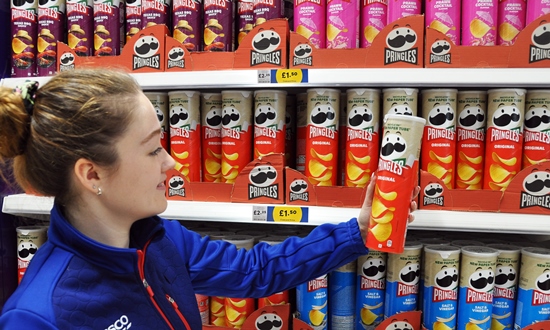
The iconic Pringles can originally launched in the 1960s, with a steel base, was understood to not be recyclable.
The switch involved an investment of £86m in new technology the paper tubes are available exclusively in Tesco stores and online.
The new tube is made from recycled paper and has a paper base, which means customers can put it straight in their home recycling bin. It will have a plastic lid that can also be recycled.
Owner Kellanova said the packaging has been rigorously tested by the company’s packaging experts to make sure it protects the iconic saddle-shaped chips and keeps them fresh for 15 months, just like the old can.
The new packaging will land exclusively in Tesco stores and online from this week, before being rolled out to other supermarkets towards the end of 2024. Tubes can also be found in One Stop stores, part of the Tesco Group. Around 48 million recyclable Pringles tubes will be sold in Tesco in the first year alone.
Chris Silcock, UK managing director, Kellanova, said: “We know people want to reduce their impact to the planet and it’s our responsibility to improve the recyclability of our packaging. We’ve worked hard to develop and test a recyclable Pringles paper tube and we made significant investment in new technology to enable our factories to produce it.
“Not only is it widely recyclable but it keeps the chips fresh and tasty and protects them from breaking which helps to reduce food waste.”
Seàn Cairns, president – global rigid paper and closures (RPC) at Sonoco, worked with Pringles technical teams, to develop the new ‘designed for recycling’ tube. He noted that consumers are more aware than ever of how their purchasing behaviours are impacting the environment, as well as the more sustainable packaging options available to them.
“With this in mind, it’s important for businesses to stay ahead of the curve by exploring new packaging technologies and materials.
“It was a pleasure working with Pringles and we look forward to seeing how the new paper-based tube is received by the market. We hope the success of this project inspires other companies and brands to convert to more sustainable packaging.”
Paul Sanderson, chief executive of the Recycling Association, added: “It has taken a great deal of research and development to achieve a fully paper-based tube with a paper end that also keeps the Pringles crisps as fresh as before. It is a fantastic example of what can be achieved when manufacturers decide they want to create packaging that is easy for the consumer to recycle, and I hope others follow Pringles’ example to help us all get closer to a circular economy.”
Claire Lorains, Tesco’s group sustainability and quality director, said: “We want to make it even easier for our customers to recycle, so we are excited to bring them a product they love in a more sustainable way. Across our own brand products, where we can’t remove packaging, we work to ensure it is recyclable, and actively encourage our branded suppliers to do the same. The new paper-based Pringles tube from Kellanova demonstrates the tangible environmental opportunities that exist across food packaging that work for customers and the planet. We hope to see other suppliers take similar steps to improve packaging across all the products we sell.”



